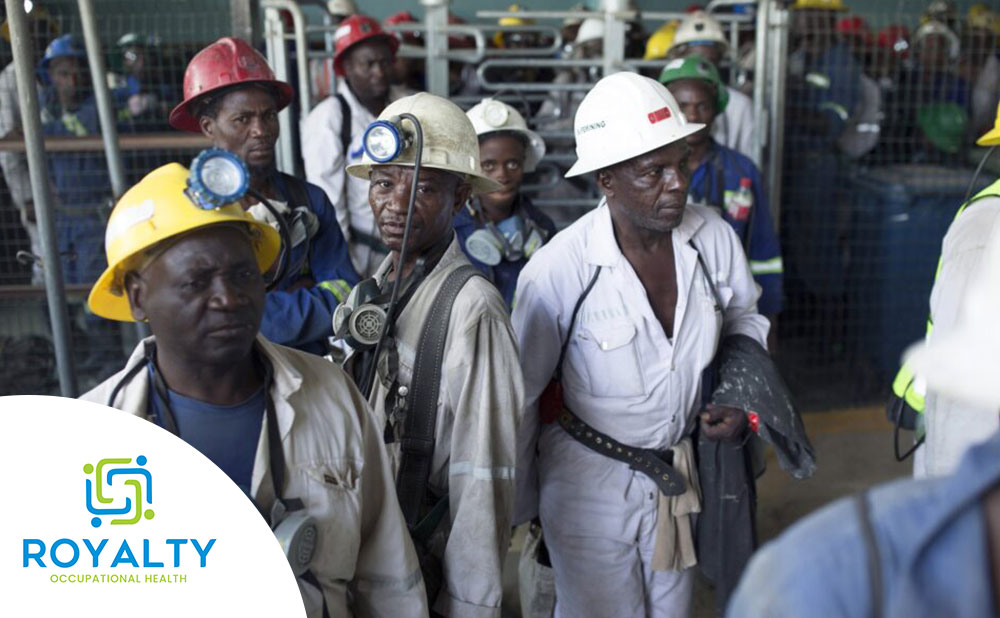
🩺 Risk-Based Medical Examinations in the Workplace
Not every job carries the same risks. A construction worker, a miner, and an office administrator face very different health hazards. That’s why at Royalty Occupational Health Services, we provide risk-based medical examinations that are tailored to the unique conditions of your industry and work environment.
A risk-based medical goes beyond general check-ups — it focuses on exposures and hazards employees may face daily. This approach helps employers safeguard their workforce, comply with regulations, and reduce long-term health risks.
🔎 What is a Risk-Based Medical Examination?
A risk-based medical examination is a health assessment designed around the specific hazards present in a workplace. Instead of a one-size-fits-all test, it targets risks such as:
-
Exposure to dust, silica, asbestos, or chemicals.
-
Prolonged noise exposure requiring hearing assessments.
-
Work at heights or confined spaces requiring physical fitness checks.
-
Driving and heavy machinery operation needing vision and reflex testing.
-
Contact with infectious agents in agriculture, food handling, or healthcare.
By focusing on industry risks, risk-based medicals ensure that health issues are detected early, preventing accidents, absenteeism, and costly claims.
⚖️ Why Are Risk-Based Medicals Important?
Under the Occupational Health and Safety Act (OHS Act, 1993), employers are responsible for protecting workers from hazards. A risk-based medical helps meet this responsibility by:
-
Identifying job-specific health risks early.
-
Reducing absenteeism through proactive monitoring.
-
Ensuring legal compliance with workplace regulations.
-
Protecting employees from preventable illnesses and injuries.
-
Documenting health status for HR, insurance, and legal purposes.
These examinations protect not only employee health but also company productivity and reputation.
🏭 Industries That Require Risk-Based Medicals
Risk-based medicals are particularly important in industries where employees face hazardous conditions:
-
Mining and Quarrying – monitoring exposure to dust and silica.
-
Construction – physical fitness, lung function, and vision checks.
-
Manufacturing and Engineering – noise and chemical exposure assessments.
-
Transport and Logistics – vision, hearing, and reflex testing for drivers.
-
Agriculture and Food Handling – biological hazard monitoring.
At Royalty OHS, we customize medical examinations based on the specific risk profile of your business.
📊 Components of a Risk-Based Medical
Depending on the hazards identified, a risk-based medical may include:
-
Physical examinations and occupational history review.
-
Audiometric (hearing) testing.
-
Lung function tests and chest X-rays.
-
Vision and colour perception screening.
-
Biological monitoring (drug, alcohol, or toxin testing).
-
Ergonomic and musculoskeletal assessments.
By combining these components, we create a comprehensive health surveillance programme tailored to your workforce.
💡 Why Choose Royalty Occupational Health?
-
Expertise – Over a decade in occupational health services.
-
Tailored programmes – Medicals designed for your industry’s risks.
-
Mobile services – On-site testing to reduce downtime.
-
Compliance support – Helping businesses meet OHS Act requirements.
-
Holistic care – Integration with medical surveillance, wellness, and consultancy.
We don’t just provide medicals — we provide health solutions that strengthen your workforce.
✅ Conclusion
A risk-based medical examination is a proactive way to protect employees, improve safety, and stay compliant with occupational health regulations. By tailoring medicals to workplace hazards, employers reduce risks, detect health issues early, and create safer working environments.
At Royalty Occupational Health Services, we specialize in delivering effective, affordable risk-based medicals across South Africa.
Frequently Asked Questions
It is a health assessment tailored to workplace hazards, focusing on risks like dust, noise, chemicals, or physical strain, rather than a general check-up.
Industries such as mining, construction, manufacturing, agriculture, and logistics require risk-based medicals to protect employees and comply with regulations.
The frequency depends on workplace risks, but most high-risk industries require annual or periodic assessments to ensure compliance and worker safety.
